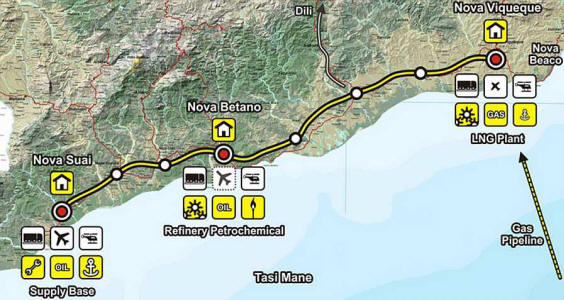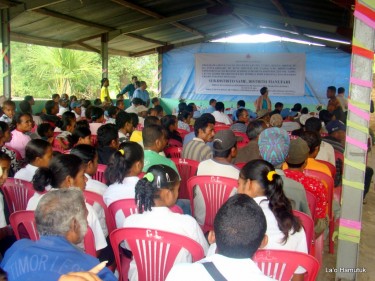A local Non-Government Organization, La'o Hamutuk, has set-up a special website page to gather information, monitor project updates, and document the resistance of a community to East Timor’s Tasi Mane Petroleum Infrastructure Project.
Tasi Mane (Male Sea) Project is among East Timor’s flagship strategic development programs:
To bring petroleum development to our shores and provide a direct economic dividend from petroleum industry activities, supporting infrastructure will be developed on the south coast of Timor-Leste. This will be led by the Tasi Mane Project, a multi-year development of three industrial clusters on the south coast which will form the backbone of the Timor-Leste petroleum industry. The project will involve development of a coastal zone from Suai to Beaço and will ensure that required infrastructure is in place to support a growing domestic petroleum industry. Tasi Mane will include the Suai Supply Base cluster, the Betano Refinery and Petrochemical Industry cluster, and the Beaço LNG-Plant cluster.
East Timor is dependent on its oil revenues but economists have already advised it to diversify its economy. La'o Hamutuk thinks that Tasi Mane reflects the continuing dependence of the country on the petroleum industry:
…the 2011 state budget allocates over $30 million for the Tasi Mane project, more than twice as much as the Ministry of Agriculture. We lamented the nearly exclusive focus on the petroleum industry (and resulting lost opportunities to explore other possibilities for economic development).
Since there is consensus that Timor-Leste needs to move away from oil-dependency in the long-term, we are disappointed that petroleum processing is the only industrial development discussed. What about agricultural processing, or light industry to replace imported products? The capital-intensive oil industry will provide few jobs for anyone, including Timorese. Allocating most of our intellectual and financial resources to the petroleum sector obstructs moving to a non-oil economy after oil and gas reserves are used up in 13 years.
The group is concerned that a large amount of public money has been allotted to a single project:
We also wonder about the economic viability of the Tasi Mane project, given that no private sector investors have shown interest. From an investment perspective, the returns may not justify the amount of public money being expended
It also doubts if the project will generate enough number of jobs for the local population:
…nothing is said about how many jobs these projects will provide for Timorese workers, how much land they will take from uses such as agriculture and fishing, how many people will have to be displaced, or how much revenue they will generate for the state.
If Parliament does not receive such information in a credible and accessible form, we urge you not to give the Government a “blank check” for a project which may turn out to be useless or have negligible benefits
Based on the government’s Procurement Portal, most of the companies which signified intention to participate in the program are foreign companies. One of the qualified firms, TOKE OIL & GAS SA, received a contract worth US$6,639,517.
The Tasi Mane became controversial because many communities will be affected and displaced by the project. One community member, Manuel da Costa, clarifies that the people are not against development:
…the south coast land will be a Promised Land for Timor-Leste's development, but we children of Betano will become victims of development. We from Betano support development, but our needs must be considered.
The Betano community has already agreed to give up four hectares of their land to the government but it protested the occupation of their other lands:
The People of Betano, Aldeia Bemeta months ago offered four hectares of their land to the Government in order to construct a heavy oil power station. Recently the Government contracted Tinolina Construction Ltd, to prepare the site. During this process they occupied more land.
Because this occupation of land was more than the original agreement between the Government and the Community, the community began to organize themselves as is their right, consecrated in the Constitution as People of an “independent nation”.
The Government and the Company showed a lack of transparency and much manipulation of facts throughout the entire process, and there are many inconsistencies in their story.
When they protested, the action was violently dispersed by the police:
Because of this the community carried out a peaceful action in the field. However the community suffered violent actions from the Police who went to intervene and prevent this peaceful demonstration









3 comments